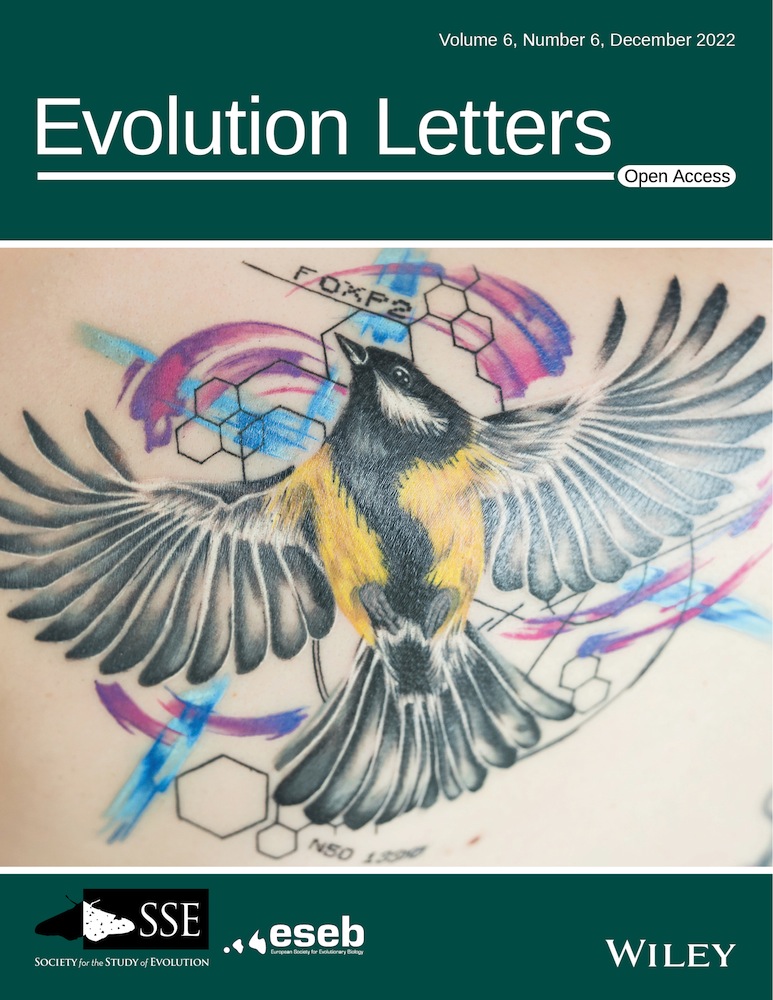宿主学习选择了更大的卵模仿和更窄的抗寄生卵排斥阈值的共同进化
IF 3.4
1区 生物学
Q2 EVOLUTIONARY BIOLOGY
引用次数: 0
摘要
拒卵是一种有效而广泛的抗寄生防御手段,可有效地清除寄主巢中的外来卵。一些观察和关键的实验证据支持宿主在识别寄生卵和自身卵方面的学习作用;具体来说,有过或目前有过幼虫寄生经历的个体宿主更有可能排斥外来卵。在这里,我们通过实验证实了先前的经验在改变美洲知更鸟(Turdus migratorius)随后的卵排斥决定中的作用,Turdus migratorius是一种专性幼虫寄生虫褐头牛鹂Molothrus ater的自由生活宿主物种。然后,我们对寄生卵对宿主卵的模仿程度和宿主卵的排斥阈值的共同进化轨迹进行了建模,以响应学习在卵识别中日益重要的作用。关键的是,随着更多的了解,我们看到宿主的排斥阈值更窄(更具歧视性),寄生虫的卵子模仿能力更强。增加寄主卵数(卵/巢数)和增加寄生虫负荷(寄生率)也对卵排斥阈值有收窄的影响。综上所述,这些结果表明,从先前的卵排斥经验中学习可能在幼虫寄生虫的仿卵谱系和宿主的精致卵排斥防御的共同进化中发挥重要作用。本文章由计算机程序翻译,如有差异,请以英文原文为准。
Host learning selects for the coevolution of greater egg mimicry and narrower antiparasitic egg-rejection thresholds
Abstract Egg rejection is an effective and widespread antiparasitic defense to eliminate foreign eggs from the nests of hosts of brood parasitic birds. Several lines of observational and critical experimental evidence support a role for learning by hosts in the recognition of parasitic versus own eggs; specifically, individual hosts that have had prior or current experience with brood parasitism are more likely to reject foreign eggs. Here we confirm experimentally the role of prior experience in altering subsequent egg-rejection decisions in the American robin Turdus migratorius, a free-living host species of an obligate brood parasite, the brown-headed cowbird Molothrus ater. We then model the coevolutionary trajectory of both the extent of mimicry of host eggs by parasitic eggs and the host’s egg rejection thresholds in response to an increasing role of learning in egg recognition. Critically, with more learning, we see the evolution of both narrower (more discriminating) rejection thresholds in hosts and greater egg mimicry in parasites. Increasing host clutch size (number of eggs/nest) and increasing parasite load (parasitism rate) also have narrowing effects on the egg-rejection threshold. Together, these results suggest that learning from prior experience with egg rejection may play an important role in the coevolution of egg-mimetic lineages of brood parasites and the refined egg rejection defenses of hosts.
求助全文
通过发布文献求助,成功后即可免费获取论文全文。
去求助
来源期刊

Evolution Letters
EVOLUTIONARY BIOLOGY-
CiteScore
13.00
自引率
2.00%
发文量
35
审稿时长
10 weeks
期刊介绍:
Evolution Letters publishes cutting-edge new research in all areas of Evolutionary Biology.
Available exclusively online, and entirely open access, Evolution Letters consists of Letters - original pieces of research which form the bulk of papers - and Comments and Opinion - a forum for highlighting timely new research ideas for the evolutionary community.
 求助内容:
求助内容: 应助结果提醒方式:
应助结果提醒方式:


